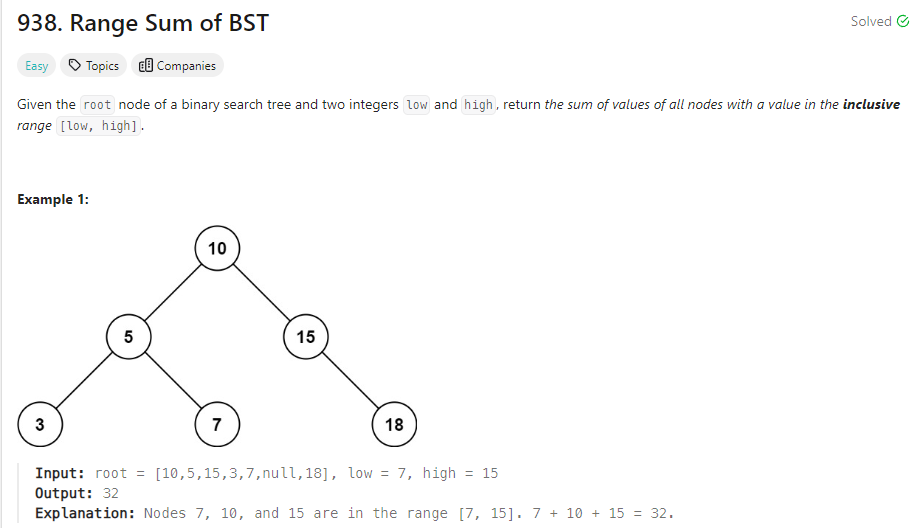Problem of The Day: Range Sum of BST
Problem Statement
 See problem here.
See problem here.
Intuition
The problem requires calculating the sum of values within a binary search tree (BST) that fall within a specified range. My initial thoughts involve performing a depth-first traversal of the BST, and for each node, checking if its value lies within the given range. If it does, I will include it in the sum, and then recursively explore its left and right subtrees.
Approach
The approach involves a recursive depth-first traversal of the BST. Given a function rangeSumBST that takes a node, low, and high as parameters. Within this function:
- I handle the base case where the node is
None, returning0. If the value of the current node is within the specified range (lowtohighinclusive), I include it in the result and recursively call the function on its left and right children. - If the value is less than
low, I explore only the right subtree. - If the value is greater than
high, I explore only the left subtree. The final result is the sum of values within the specified range.
Complexity
-
Time complexity: O(n) - The algorithm traverses each node of the BST once.
-
Space complexity: O(h) - The space required by the recursive call stack is proportional to the height of the BST, where h is the height. In the worst case, when the tree is skewed, the space complexity is O(n).
Code
# Definition for a binary tree node.
# class TreeNode:
# def __init__(self, val=0, left=None, right=None):
# self.val = val
# self.left = left
# self.right = right
class Solution:
def rangeSumBST(self, root: Optional[TreeNode], low: int, high: int) -> int:
if not root:
return 0
result = 0
if low <= root.val <= high:
result += root.val + self.rangeSumBST(root.left, low, high) + self.rangeSumBST(root.right, low, high)
else:
if root.val < low:
result += self.rangeSumBST(root.right, low, high)
elif root.val > high:
result += self.rangeSumBST(root.left, low, high)
return result
Editorial Solution
Iterative implementation
class Solution:
def rangeSumBST(self, root: Optional[TreeNode], low: int, high: int) -> int:
ans = 0
stack = [root]
while stack:
node = stack.pop()
if node:
if low <= node.val <= high:
ans += node.val
if low < node.val:
stack.append(node.left)
if node.val < high:
stack.append(node.right)
return ans